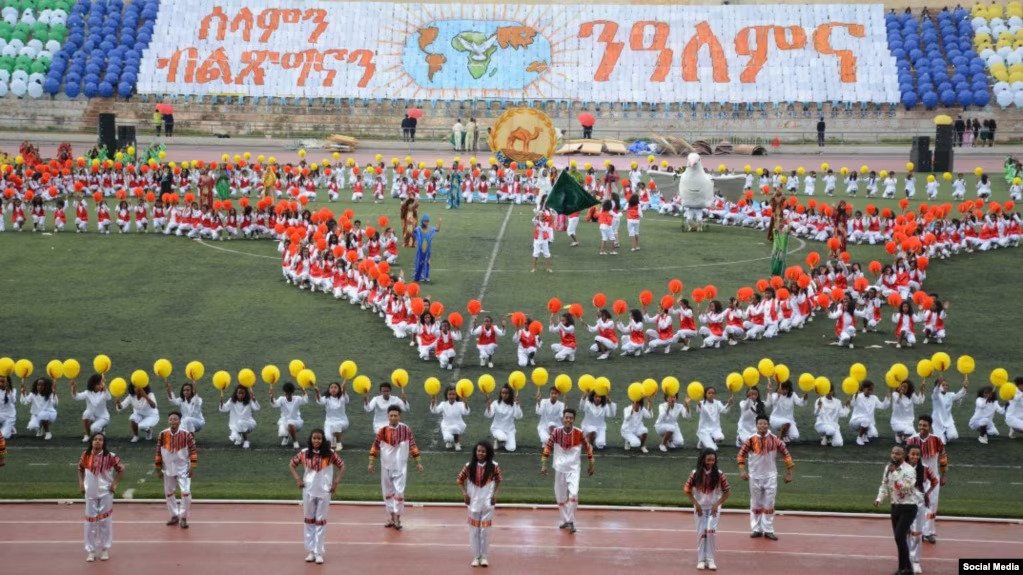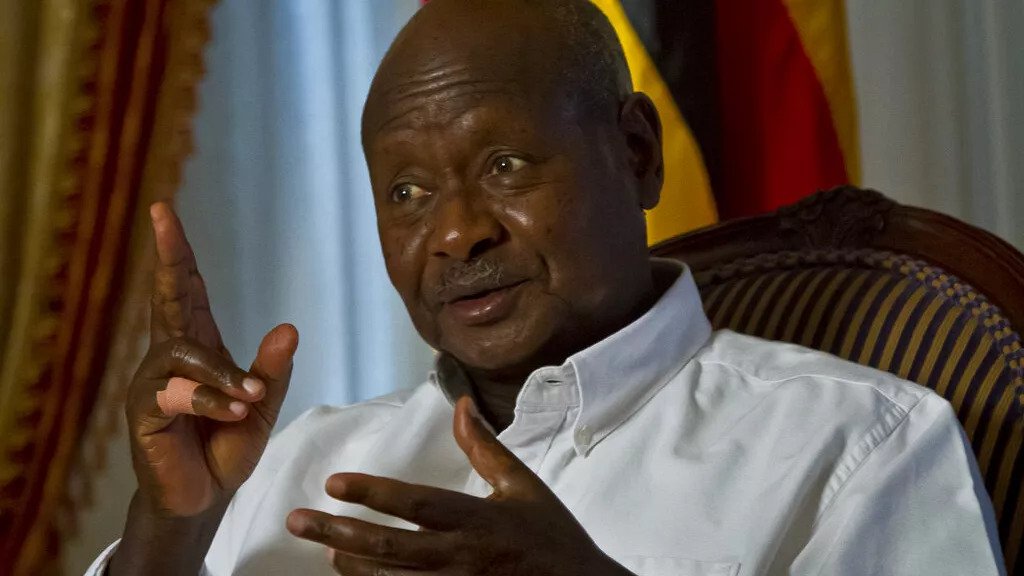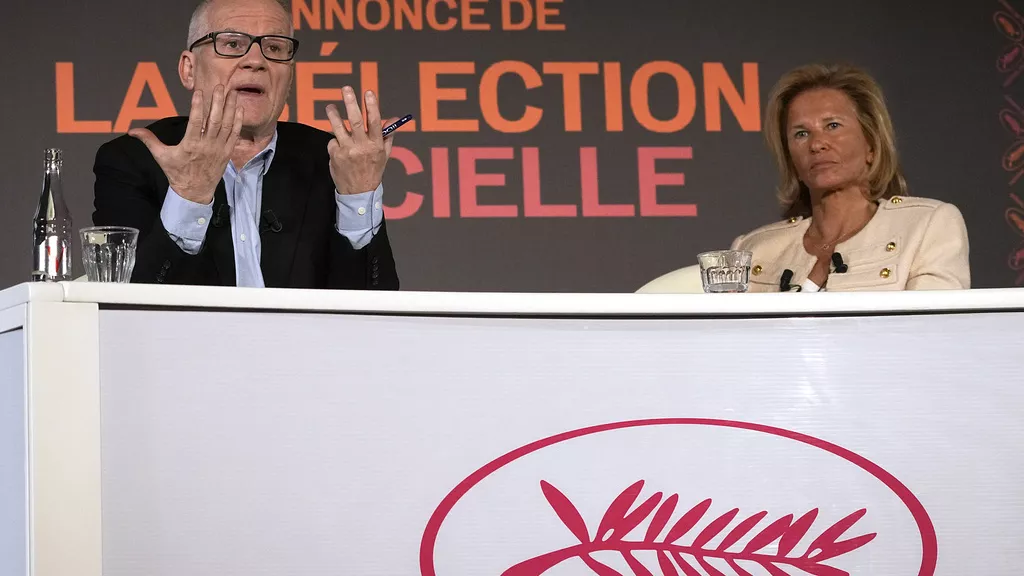
NAIROBI – As a child, Filmon Debru longed for the festivities every May celebrating Erititra’s independence, and the heroes who fought and died for it. But he is no longer cheering as Eritrea marked the holiday, formally declared on May 24, 1993.
The hope and possibility Filmon felt for his young country is gone, crushed by a regime so totalitarian and repressive that Eritrea is widely called “the North Korea of Africa.”
In the small and secretive one-party state, critics disappear into gulags and civilians are conscripted for life or forced into labor under an extreme policy of national service that has been likened to slavery.
Elections have never been held and it has no free press, political opposition, or civil society.
A global pariah, the Red Sea nation has been sanctioned for meddling in regional conflicts, including most recently over abuses by its army in the Tigray war in Ethiopia.
Hundreds of thousands of Eritreans desperate for jobs and freedom have fled the tiny country, including Filmon, who risked his life to leave behind the homeland he once so proudly loved.
“Honestly, what would I be celebrating?” said the software developer, who nearly lost both hands after being chained and tortured by people smugglers in the Sinai Peninsula.
He has lived in Germany since 2014.
“What kind of independence celebration would it be?”
– ‘They paid their life for this?’ –
In Eritrea, public commemorations are well under way, with school children in colorful regalia singing patriotic songs along this year’s theme, “Heroic Feat Anchored on Cohesive Ranks.”
An “independence cup” has cris-crossed the nation, collecting “sacred soil” from the sites of legendary battles in Eritrea’s decades-long struggle against its much larger neighbor.
Propaganda aired on state-run Eri-TV throughout May hailed Eritrea’s freedom fighters but erased the heroism of independence icons who later criticized the regime, said Meron Estefanos, a Swedish Eritrean journalist and activist.
Like many Eritreans, she lost family in the liberation war, and the exploitation of their sacrifice angers her year after year.
“What would they have said?” Meron said of her four uncles who died during Eritrea’s fight for self-rule. “This is what they paid their life for?”
Isaias Afwerki, who led the rebels to victory, became president after independence until elections could be held under a new constitution.
The early years were full of promise.
Parents named their newborns Netsanet (Freedom), Awet (Victory) and Selam (Peace), freedom fighters were mobbed in the street with flowers and kisses, and media flourished.
But it was short-lived.
In 1998, Eritrea and Ethiopia began a war over a nondescript border town that lasted two years, ended in stalemate, and cost tens of thousands of lives.
Meron said it was the children of independence fighters – the generation upon whom Eritrea’s future was pinned – sent to die on the front.
“They danced for independence then… they were martyred for a meaningless war,” said Meron, whose younger brother was conscripted.
Any hope for democracy was extinguished in a brutal purge of the political opposition in 2001 that cemented Eritrea’s reputation as one of the world’s most draconian states, and Isaias its ruthless dictator.
Private media was banned and Eritrea still sits near the bottom of global rankings for press freedom, as well as human rights, civil liberties and economic development.
Vanessa Tsehaye’s uncle, a respected journalist, disappeared in the 2001 crackdown.
But the 26-year-old activist said independence day was a chance to honor him and others who dreamed of a free Eritrea “by continuing the work they started and gave up so much for.”
“Independence day for me is a call to action,” said the Swedish-born campaigner, who founded One Day Seyoum, a rights movement named after her uncle.
Habte Hagos, who has spent most of his adult life outside Eritrea, said many in the diaspora “dream day and night of returning” and independence day was a painful reminder of the lost years.
But he said attitudes were hardening, particularly as young Eritreans continued to suffer like their forebears as refugees or foot soldiers in wars like Tigray.
“We’ve had more than 60 years of misery,” said Habte, who founded the respected advocacy group Eritrea Focus in 2014.
“Eritreans have had enough.”
Nigeria’s Tiwa Savage to perform at coronation of King Charles III

Sunday Alamba/Copyright 2019 The AP. All rights reserved
By Rédaction Africanews with Agencies
Nigerian singer has been invited to perform at the coronation of the British monarch, King Charles III.
The historical event is scheduled to hold on Saturday, May 6, 2023, at Westminster Abbey, London.
According to reports, Tiwa Savage will be joining an array of celebrities such as Steve Winwood, DJ Pete Tong, Lang Lang, Lucy, Paloma Faith, and Olly Murs, who will entertain guests at the coronation concert and Big Lunch scheduled for Sunday, May 7, 2023.
The coronation follows the passing of King Charles III’s mother, Queen Elizabeth II, and will witness the official ascension of the monarch to the throne alongside Queen Consort, Camilla.
Tiwa Savage’s invitation to perform at the coronation is a significant milestone, as she becomes the first Nigerian artiste to receive such an honour.
In a statement, the organizers disclosed that Tiwa Savage was selected as one of the few African artistes to perform at the historical coronation concert.
“We are excited to announce that Tiwa Savage will be performing at the coronation concert alongside other world-class musicians. Tiwa Savage is an exceptional artiste with a unique blend of African and Western sounds…,” the statement read.
Uganda: President calls for ‘review’ of controversial anti-LGBT+ law

Bebeto Matthews/AP
By Rédaction Africanews with AFP
The Ugandan president asked parliamentarians to “reconsider” a controversial anti-LGBT+ law in a letter read out Wednesday in parliament, urging them to keep the criminalization of same-sex sexual relations but not of “being homosexual.
The bill, which was passed on March 21 and provides for stiff penalties for those involved in same-sex relationships, has sparked outrage from human rights organizations and Western governments, which have threatened sanctions.
“I am sending the bill back to parliament for reconsideration,” wrote Yoweri Museveni, saying that “certain provisions must be reconsidered and reviewed” in a letter read by the deputy speaker of parliament, Thomas Tayebwa, to the elected representatives gathered in session.
The head of state, who himself regularly describes homosexuality as “deviance”, asked the elected representatives to “make a distinction between being homosexual and engaging in homosexual acts”.
“It is clear that our society does not accept homosexual conduct or acts, so the proposed law must be clear so that what is criminalized is not the state of a person with a deviant propensity but rather the acts of a person acting on or promoting that basis,” he writes.
“The bill should be revised to include a provision that clearly states…that a person who is presumed or suspected to be homosexual and who has not committed a sexual act with another person of the same sex is not committing an act of offense,” he continues.
– “Discriminatory text” –
No mention is made of the penalties listed in the law. According to gay advocates, the original text provides that anyone who engages in homosexual activities is liable to life imprisonment and, in the case of a repeat offence, the death penalty.
The death penalty has been included in Ugandan law and has not been applied for years.
Homosexuality is illegal in Uganda and so-called “unnatural” relationships have been punishable by life imprisonment since a law dating back to British colonization.
Mr. Museveni is also asking parliamentarians to review the “duty to report acts of homosexuality” section, which he says “presents constitutional challenges and could be a source of conflict in society.
The law should also facilitate the “rehabilitation” of homosexuals who come “seeking help,” he said.
Last week, government lawyers and ruling party parliamentarians asked the president to reconsider the law.
Since the law was passed, the UN, Amnesty International, the United States, the United Kingdom, and the EU have urged President Museveni not to enact the law.
The White House has warned Uganda of potential economic “consequences. The UN High Commissioner for Human Rights, Volker Türk, denounced the text as “discriminatory – probably the worst of its kind in the world.
In a resolution on April 20, MEPs deplored “President Museveni’s contribution to the rhetoric of hatred towards LGBT+ people”, adding that “relations between the EU and Uganda will be threatened if the President enacts the bill”.
Homophobia is widespread in Uganda, as it is across East Africa.
While there have been no prosecutions for homosexual acts in recent years, harassment and intimidation are a daily occurrence for homosexuals in Uganda, where an evangelical Christianity has developed that is particularly vehement against the LGBT movement
Viola Davis honoured at the 48th annual Chaplin Award Gala
Evan Agostini/2023 Invision
Viola Davis was honored as the 48th Chaplin Award Gala recipient Monday (24 April 2023) in New York.
Davis, a rare EGOT winner, says she feels the same as she did when she appeared in the directorial debut of Denzel Washington “Antwone Fisher,” her first role in a major film.
“I don’t feel any different…the biggest excitement besides working with Denzel and working with Derek, Luke and all the beautiful actors on there was I had two days of work, so it was supposed to be one day and it ended up being two days,” said ‘The Woman King’ star.
“I made $671 for two days. I’ve always felt like the privilege was just doing it. See, I’m from the other side of acting, that 95% unemployment rate, 1% that make $50,000 a year or more. I never got into it to be famous.”
Davis is also set to star in “Waller,” a spinoff of the DC Comics “Peacemaker” franchise, but the Oscar winner was hush on how far along she was into the project.
“I can’t tell you that,” she said with a smile. “But when it happens, it’s going to be awesome.”
Presenters for Davis included Oscar winners Meryl Streep and Jessica Chastain, along with “The Woman King” director Gina Prince-Bythewood.
“I was being recognized with the Elle Woman in Hollywood as like this newcomer and Viola Davis showed up and gave a speech and that meant a lot to me,” said Chastain. “When I got asked about doing this, there was never, no matter how—I’m doing a play right now, and I love it, but I’m exhausted…the exhaustion is never too great to show up for Viola Davis. That’s the person—and that’s what she means to me.”
Prince-Bythewood said while Davis can do no wrong on the screen, she’d like to see her show off her funny side.
“I want to see her in a comedy because she’s hysterically funny and it’s certainly something people need to know about,” said the “Love & Basketball” filmmaker.
“I think I want to write something for her to show that side of her.”
The Chaplain Award Gala began in 1972 and is the most important fundraising event of the year for Film at Lincoln Center, with all proceeds benefiting the organization in its mission to support the art and craft of cinema.
S.A: African debut of acclaimed production ‘The Head and the Load’
AFP
By Rédaction Africanews and AFP
A man paces a 50-metre (yard) stage doing breathing exercises. Crew members chatter while putting together final touches to the set, as a pianist rehearses.
Acclaimed South African artist William Kentridge’s play “The Head & The Load” puts a final touch for the piece much-awaited premier at the Joburg Theatre.
“Being able to show it at home feels very important,” Kentridge told AFP of the show, which centres on African porters who, at the call of their colonial masters, hauled arms, cannons and supplies for European forces during World War I.
The production made its international debut in London in 2018 but has never been shown on African soil.
That is set to change on Friday (Apr. 21) as, after delays caused by coronavirus pandemic, the piece is set to premier at the Joburg Theatre in Johannesburg.
“This piece is about a hidden history, a history that was deliberately hidden,” Kentridge, 67, said as the cast took their places for a final dress rehearsal on Thursday night.
About one million African soldiers, porters and labourers are believed to have taken part in the 1914-18 conflict, according to the United Nations cultural agency, UNESCO.
More than 150,000 of them died.
“I think a starting place of the project was an ignorance, and an annoyance at my own self at my own ignorance,” the artist said. “I thought I knew the First World War.”
Layered meanings
“The Head & The Load” takes its name from a Ghanaian proverb — “The head and the load are the troubles of the neck”. At the rehearsal, the words are projected in enormous white text onto the stage.
But it takes a brief explanation, and a moment of reflection, to better understand their meaning.
“There’s… a physical load that the people are carrying, there’s a historical load of how we got here, and there’s a psychic load of how does one keep this history in one’s head,” Kentridge said.
Renowned for his animated films of shape-shifting charcoal drawings, the thickly eye-browed artist described the show as “a very wide drawing… moving in three dimensions”, combined with silhouettes, “added text and a great deal of music.”
Choreographer Gregory Maqoma said he looked forward to performing for a home audience.
The production aimed at “fulfilling” a void for “those who never made it back home,” he said.
Among them was a distant relative of the show’s co-composer, 35-year-old, Thuthuka Sibisi, who said one of his ancestors died on board the SS Mendi, a British steamship that sank in the Channel in February 1917.
“Doing research I found that like my, there is a Sibisi great great great great great something that was sort of like on the ship as well, so for me there is something about like a personal link to it. So I think a lot about sort of the personal archive versus sort of an African archive. And how we sort of puzzle all these pieces together to really try to kind of navigate a narrative that we can all be part of, and we are all responsible for.”
The vessel was taking more than 600 mostly black South African soldiers to the front in France.
“The role and responsibility here is to… reconsider what we think is history” Sibisi said.
“The Head & The Load” runs at the Joburg Theatre from April 21 to May 6.
Cannes Festival: Film by Cameroonian director shortlisted for the Directors’ Fortnight

Michel Euler/Copyright 2023 The AP. All rights reserved.
By Rédaction Africanews and AFP
The portrait of a bipolar filmmaker by Michel Gondry, films from Cameroon, India or Russia: the Directors’ Fortnight, one of the main parallel sections of the Cannes Film Festival, announced Tuesday (Apr. 18) its 55th selection.
The Fortnight differs from other selections at Cannes with its spirit of non-competition and is dedicated to the discovery of new filmmakers. This year some renowned directors were featured though.
French Michel Gondry (“Eternal Sunshine of a Spotless Mind”, “Soyez sympas, rembobinez”), will present “Le livre des solutions”, a “comedy around the creative process (…) of a bipolar filmmaker”, with actor Pierre Niney and comedian Blanche Gardin, announced the general delegate, Julien Rejl.
South Korean Hong Sang-soo, a regular at major festivals, was selected for the closing night (with “Woo-ru-ui-ha-ru”), and the Fortnight will also screen the latest films by Cédric Kahn, the director of “La Prière”, who is back with “Le Procès Goldman” about radical left-wing activism in the 1970s, and Bertrand Mandico’s new baroque queer work.
Most of the selection of 19 previously unreleased films is, however, centered around discoveries, including a Belgian-Cameroonian film “between fiction and documentary” on the journey of a courageous mother (“Mambar Pierrette” by Rosine Mbakam).
The director will present her very first full-length film in Cannes. Speaking to Belgian media house RTBF, she shared her excitement:”For me and my family in Cameroon, film was like a world apart where there were only incredible stories, embodied by incredible people. In my film, those incredible people are my family and the stories are theirs.”
The Directors’ Fortnight’s selection also includes an Indian film on the repression of sexuality (“Agra” by Kanu Behl), a “totally independent” Russian road-movie shot in 2021 (“Grace” by Ilya Povolotsky).
Some 4,000 films were viewed (including short films) which show a “return in force of Asia, the United States and some African proposals,” Thierry Fremaux, the delegate general of the Cannes Film Festival said.
The films selected “embody a spirit of resistance to all forms of ideology and dominant discourse. Among the recurring themes, “the unease between the sexes”, “the return of religion” and a strong presence of genre cinema, from fantasy to adventure through the thriller, he pointed.
Like all Cannes selections the Quinzaine des cinéastes [Editor’s Note: New name of the selection in French which erases the masculine form of the plural which the previous name featured] refuses to accept any quotas related to origin or gender.
In total, 27% of the feature films submitted were directed by women, who account for a slightly higher proportion of the feature films selected, at 32%, said Rejl.
Netflix to expand its operations in Africa, building on its success

AP Photo
By Rédaction Africanews with AFP
Netflix said Wednesday it plans to expand its operations in Africa, building on the success of shows and series like the South African series “Blood and Water.
The online video-streaming giant said it has invested the equivalent of €160 million in film content production in Africa since it began working on the continent in 2016. “The expansion of our operations here is a good thing for Netflix,” the company said in a report.
Its operations in Africa have focused on South Africa, Kenya, and Nigeria, creating more than 12,000 jobs, according to the company. “This is a start, we plan to reach more countries on the continent,” Shola Sanni, Netflix’s policy director for sub-Saharan Africa, said at a press conference in Johannesburg.
Currently, South Africa is the site’s top African contributor, with more than 170 films, series, and documentaries. In 2020, “Blood and Water,” a series centered on a Cape Town teenager who investigates her sister who was abducted at birth, had even placed first in the United States.
“We’ll build on these milestones to grow our business while continuing to invest in supporting local creative economies and giving more and more African storytellers an amplified voice on the global stage,” the company promises.
In recent years, Netflix has relied on diversifying its production outside the U.S., achieving big scores with series like Spain’s “La casa de papel” and the South Korean dystopian drama “Squid Game,” a Golden Globe-winning global hit.
In 2021, the company has partnered with Unesco to fund six short films by young African directors. “It’s time for mainstream platforms to realize the richness and value of our stories,” one of those winners, South African filmmaker Gcobisa Yako, told AFP on Wednesday on the sidelines of the press conference.
Guyana celebrates cowboy lifestyle with festival
Matias Delacroix/Copyright 2023 The AP. All rights reserved
By Rédaction Africanews and AP
Loud country music came through the speakers as cowboys entered the arena to kickstart this year’s Rupununi Ranchers Rodeo in Lethem Guyana.
Since the mid-eighties, the Rupununi Ranchers’ Rodeo ground in the country’s southwest has hosted one of the nation’s main cowboys fest.
Thousands of visitors travelled from the capital and abroad to attend the annual-event held over the weekend (Apr. 08-09).
For 22-year old Shinier Smartt, who travel with friends, it was a first.
“I came up here a couple of days ago. We travelled up with a truck it was just the dust (that bothered a little) but the trail and everything, the scenery has just been very much beautiful,” she says.
“We haven’t been getting any problems on the trip, the entire trip has just been a fun one. And we are here for the famous rodeo and so far, its just been very thrilling.”
Popular events include bareback bronco, saddle bronco, steer roping, ribbon roping and wild cow milking, and cowboys and cowgirls pit their skill against one another in a friendly competition.
Rancher Ian Rodriguez is a native of Rupununi. Like his father did once, he’s one of the festival’s judges.
The legacy lives on
“In the past, Lethem, Rupununi was known as one of the biggest livestock rearing regions. We had a lot of good ranchers, cattle. And we do it for personal gain, commercial business, you know, and everybody growing up knowing that Lethem is a ranching area, you know, The Rupununi. That’s why that that legacy still lives on, you know.”
The rodeo is organized by The Rodeo Committee which is a part of the Rupununi Livestock Producer’s Association. The event is seen as a focal point for continuing the traditions of the Rupununi, but also is a growing tourism attraction.
Rodeo participants are mainly local cowboys and cowgirls, with very few professional rodeo riders. However some participants come all the way from Britain, the United States and Brazil.
Among the authorities of Guyana who attended the event this year was President Mohamed Irfaan Ali.
I. Coast: Baulé communities travel to celebrate ‘Paquinou’
AP Photo
By Rédaction Africanews and AP
Wearing masks which represent spirits and ancestors and performing dances: Sunday (Apr. 9) was a feast day for the Baule people in the centre of Cote d’Ivoire.
Some gathered in their village of Sakassou to celebrate “Paquinou” or Easter.
Speakers of Baulé are part of the ethnolinguistic grouping of peoples of the Guinea Coast who speak Akan languages.
“Today Paquinou has become a holiday for the Akan people”, Evangeliste Gibet explains.
“It is during this holiday that the family gathers, parents come, cousins, sisters, nephews and aunts, everyone comes for family reunions.”
To mark the occasion, the Baule people also celebrate with dances, a traditional alcoholic beverage prepared by distillation of palm, called koutoukou and Christian mass.
The festival is also seen as a way to connect with the spiritual world. The mix of traditional and Christian customs during Easter brings together the community and the different groups and believers.
“Paquinou for us, the Baule, is the great moment of reunion to settle our conflicts and think about the development of our villages,” local resident Richmond Kouassi says. “So here is why we have chosen Easter and we say Paquinou, which means Easter for Baule.”
To keep their tradition alive, people from across the Baulé Kingdom work hard to make the journey home and celebrate Paquinou.
East of Sakassou,the Kingdom’s capital, an international festival in Daoukro celebrate the Baulé heritage.
Young Ugandans train as make up artists for film industry
Cleared
By Africanews with AP
Like a painter with a blank canvas, Esther Nakaziba studies her model before embarking on a long shape-shifting process.
Using a bandage and her numerous tools, she transforms this model’s face into a realistic one-eyed man who has suffered a burn.
Nakaziba is a film makeup artist in Uganda.
She says she can create fake wounds, bruises, swollen faces, rotten skin – anything a film producer desires.
She taught herself, and she says more young Ugandans are entering this industry to face skyrocketing demand from the film and entertainment industry.
Makeup artists are in demand for music videos and movie sets to create different visual scenarios and alter actors’ appearances.
She’s the organiser of a makeup artistry fair to bring all the talents together.
“We are very few in the country, so we hardly know each other. So with this space, with this exhibition, it is collecting all of us to be in one space so that we can connect, skill those that want to be skilled, train the youth so that we can build a very big team,” says Nakaziba.
Meekness Kakunzira, a local content producer and an actress, is hopeful about the future of makeup artists in the country.
“I am glad that we are growing, we are improving and I believe that people out there that are watching our crafts can really tell that there is a big shift in the industry,” she says.
Workshops are also organised to familiarise people with the film and entertainment industry.
“The classes are really helping or are really going to help a lot of people. Now like you see, in the acting industry, you don’t get jobs all the time, but if you are an SFX makeup it really helps. Today you might not be on set as an actor, but you might be on set as a makeup artist, as an SFX makeup artist, so it’s really helping. And for the guys out there, the youth most especially, because we know we are suffering with unemployment in the country, should really join this,” says Kakunzira.
Nakaziba, who has stamped her name in the local movie and music industry as a special effects (SFX) makeup artist, says the Ugandan government needs to recognise their work, which could help address the high unemployment rate.
“We are in a country where art is not really recognised to be a serious career and yet it is, because personally, it’s the only thing I earn a living from so I believe any youth can. But the only way the government can really see us as a serious industry when we have such collaborations,” she says.
Uganda has seen several blockbuster films like Last King of Scotland shot in the country. But for a long time, the country had no film makeup artists.
Producers would outsource the services from other parts of Africa and Hollywood.
Thanks to this new pool of talent, this is changing.
“More films have been coming out and thank God they are now looking for more African special effect makeup artists because before they used to bring guys from the States and if they come to Africa they just go to South Africa to look for guys,” says Grace Murema, film makeup artist.
“So now at least they go to Nigeria, they come to Kenya, they come to Uganda so at least we’ve started scattering everywhere.”

